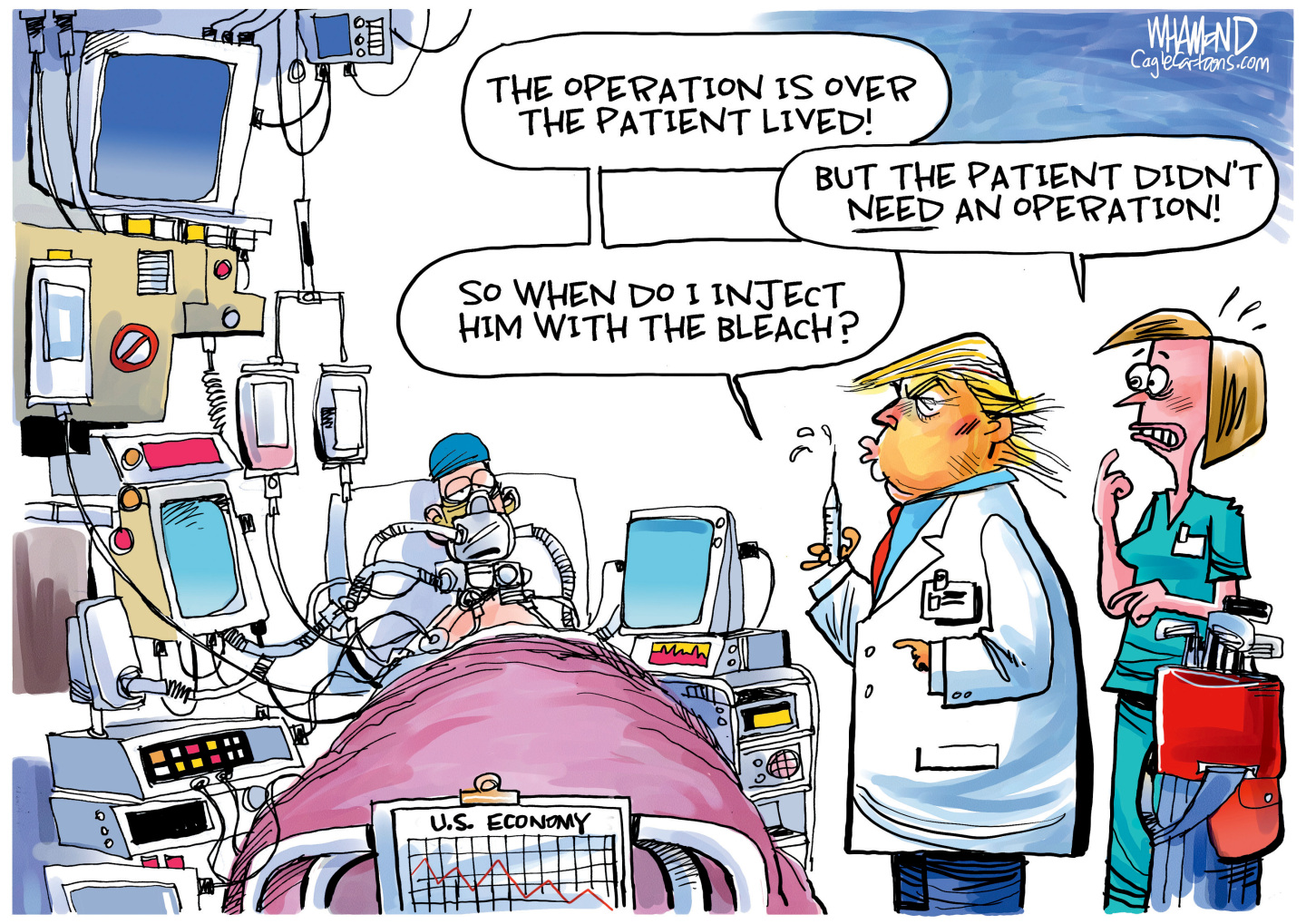Only a fool would voluntarily talk to Robert Mueller
No American should volunteer to talk to investigators. That goes for President Trump too.


Special Counsel Robert Mueller wants to talk to President Trump as part of his probe into Russian election meddling. And Trump indicated last month that he wants to talk, too. "I'm looking forward to it, actually," the president said, taking pains to inform his assembled audience of journalists that this eagerness should be taken as evidence of innocence. "Here's the story, just so you understand," he instructed the press: "There's been no collusion whatsoever."
Trump's attorneys are of a different mind. They've been negotiating the terms of the conversation with Mueller's team for some time, arguing — publicly, at least — that the special counsel has yet to present adequate evidence to justify a presidential interview. In private, I suspect their thinking is closer to that of ever-candid former White House communications director Anthony Scaramucci.
"I actually don't want [Trump] to testify," he explained in a recent interview, “because, as a lawyer, I don't want him caught in a 'gotcha' moment where someone accuses him of lying where he may not remember something or something like that."
Subscribe to The Week
Escape your echo chamber. Get the facts behind the news, plus analysis from multiple perspectives.

Sign up for The Week's Free Newsletters
From our morning news briefing to a weekly Good News Newsletter, get the best of The Week delivered directly to your inbox.
From our morning news briefing to a weekly Good News Newsletter, get the best of The Week delivered directly to your inbox.
The Mooch is right. Trump should not voluntarily speak to Mueller — just as you or I or anyone should never, ever voluntarily talk to cops or government investigators.
This is not about Trump or Mueller. Nor is it a fringe opinion. It's about how law enforcement works in America. And it is the advice of no less a legal luminary than Robert Jackson, the chief U.S. prosecutor at the Nuremberg trials who is also the only person in history to serve as a justice of the Supreme Court, U.S. solicitor general, and U.S. attorney general. As Jackson said, "Any lawyer worth his salt will tell [a] suspect in no uncertain terms to make no statement to police under any circumstances."
It is unwise to talk to the cops regardless of guilt. Perhaps you have seen the brief lecture on the subject from James Duane, a Regent University law professor and former defense attorney.
Duane’s lightning-fast exposition of seven reasons to say absolutely nothing beyond "I want a lawyer" has been viewed nearly 3 million times. The other 245 million adults in our country would do well to give it a watch.
Even if you are innocent, Duane contends, and you only tell the police what they already know, and you only tell the truth, and you never make any mistakes (a highly improbably combination of events), you will not help yourself by speaking to the cops. Innocent people lie. Innocent people forget. Innocent people make errors and get confused and exaggerate and estimate in high-pressure situations — and the police, as you may know, are skilled in creating high-pressure situations.
Thus, as the Supreme Court noted in Ohio v. Reiner (2001), the Fifth Amendment is as important to the innocent as to the guilty: One of its "basic functions ... is to protect innocent men ... 'who otherwise might be ensnared by ambiguous circumstances,'" the court said in a unanimous opinion recognizing "that truthful responses of an innocent witness, as well as those of a wrongdoer, may provide the government with incriminating evidence from the speaker's own mouth."
The great temptation to talk to the cops, of course, is in how it will seem if you are silent. "Too many, even those who should be better advised, view [the Fifth Amendment] privilege as a shelter for wrongdoers," mused the majority opinion of the Supreme Court in another case, Ullmann v. United States (1956). "They too readily assume that those who invoke it are either guilty of crime or commit perjury in claiming the privilege."
So it is with Trump. When Scaramucci told his fellow news show panelists he would advise Trump against testifying, he was met with wide-eyed shock. Trump is not the originator of the "talking = innocence" framework he presented to the media; his critics generally believe it, too.
But that framework is mistaken. If the president is innocent of collusion, as he incessantly claims, his lawyers will only be doing their most basic duty in preventing him from speaking to Mueller or his investigators. Not talking ≠ not innocent.
Trump's attorneys also no doubt realize their client's, uh, special circumstances. He is incessantly boastful and dishonest, regularly dropping demonstrable falsehoods about matters of no importance. His relationship with the truth is as casual as his marriage vows. Yes, there would be a certain satisfying justice in Trump's habitual lies getting him convicted for a crime of which he is innocent, but it is not the sort of justice we should want enshrined in our courts.
If Trump refuses to speak with Mueller voluntarily, the special counsel could compel his testimony, as defense attorney Ken White, a former federal prosecutor, explains at Reason. This would involve subpoenaing the president to testify before a grand jury, at which point Mueller would have to reveal whether Trump himself is a target or subject of the probe. (A target is a person the prosecutor wants to indict; a subject is "a person whose conduct is within the scope of the grand jury's investigation.")
In that event, Trump should not invoke presidential privilege in an attempt to escape the subpoena, as former New Jersey Gov. Chris Christie (R) has recommended. It is unlikely he would even be successful, White says, and his efforts could foster a constitutional crisis. Indeed, attempts to defy a court order that would be enforced against those of us outside the halls of power would deal a gutting blow to the already bleeding notion that we have "a government of laws, and not of men."
Trump could still take the Fifth if he appears before a grand jury as a target of Mueller's probe. And if he is prosecuted — this is all very hypothetical, of course — he could again decline to testify. His silence might slow the process and make the special counsel's job harder. But if Trump is found guilty without his own testimony, he and the public alike will know his conviction is based not on stupid braggadocio or compulsive lies. We will know it is not a "witch hunt" or a "hoax." We will know it stands on a solid case that persuaded a jury of the president's peers.
Sign up for Today's Best Articles in your inbox
A free daily email with the biggest news stories of the day – and the best features from TheWeek.com
Bonnie Kristian was a deputy editor and acting editor-in-chief of TheWeek.com. She is a columnist at Christianity Today and author of Untrustworthy: The Knowledge Crisis Breaking Our Brains, Polluting Our Politics, and Corrupting Christian Community (forthcoming 2022) and A Flexible Faith: Rethinking What It Means to Follow Jesus Today (2018). Her writing has also appeared at Time Magazine, CNN, USA Today, Newsweek, the Los Angeles Times, and The American Conservative, among other outlets.
-
 5 invigoratingly funny cartoons about healing the economy
5 invigoratingly funny cartoons about healing the economyCartoons Artists take on surgical precision, going under the knife, and more
By The Week US Published
-
 Adjapsandali: Georgian-style ratatouille recipe
Adjapsandali: Georgian-style ratatouille recipeThe Week Recommends Twist on the authentic recipe offers bursts of garlic and spices
By The Week UK Published
-
 Gaza: the killing of the paramedics
Gaza: the killing of the paramedicsIn the Spotlight IDF attack on ambulance convoy a reminder that it is 'still possible to be shocked by events in Gaza'
By The Week UK Published
-
 The JFK files: the truth at last?
The JFK files: the truth at last?In The Spotlight More than 64,000 previously classified documents relating the 1963 assassination of John F. Kennedy have been released by the Trump administration
By The Week Staff Published
-
 'Seriously, not literally': how should the world take Donald Trump?
'Seriously, not literally': how should the world take Donald Trump?Today's big question White House rhetoric and reality look likely to become increasingly blurred
By Sorcha Bradley, The Week UK Published
-
 Will Trump's 'madman' strategy pay off?
Will Trump's 'madman' strategy pay off?Today's Big Question Incoming US president likes to seem unpredictable but, this time round, world leaders could be wise to his playbook
By Sorcha Bradley, The Week UK Published
-
 Democrats vs. Republicans: who are the billionaires backing?
Democrats vs. Republicans: who are the billionaires backing?The Explainer Younger tech titans join 'boys' club throwing money and support' behind President Trump, while older plutocrats quietly rebuke new administration
By Harriet Marsden, The Week UK Last updated
-
 US election: where things stand with one week to go
US election: where things stand with one week to goThe Explainer Harris' lead in the polls has been narrowing in Trump's favour, but her campaign remains 'cautiously optimistic'
By Harriet Marsden, The Week UK Published
-
 Is Trump okay?
Is Trump okay?Today's Big Question Former president's mental fitness and alleged cognitive decline firmly back in the spotlight after 'bizarre' town hall event
By Harriet Marsden, The Week UK Published
-
 The life and times of Kamala Harris
The life and times of Kamala HarrisThe Explainer The vice-president is narrowly leading the race to become the next US president. How did she get to where she is now?
By The Week UK Published
-
 Will 'weirdly civil' VP debate move dial in US election?
Will 'weirdly civil' VP debate move dial in US election?Today's Big Question 'Diametrically opposed' candidates showed 'a lot of commonality' on some issues, but offered competing visions for America's future and democracy
By Harriet Marsden, The Week UK Published